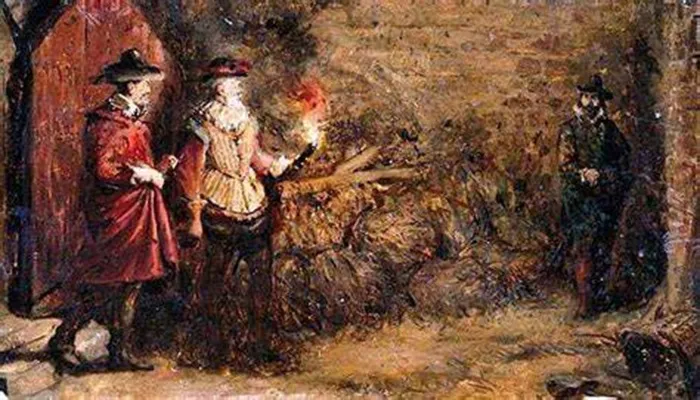January 31 has been a notable date in British history, marked by various significant events that reflect the political, social, and cultural evolution of the nation. This article will explore these events in detail, providing a comprehensive understanding of their context and implications.
What Happened on January 31 in British History?
1. Execution of Guy Fawkes (1606)
One of the most infamous events associated with January 31 is the execution of Guy Fawkes in 1606. Fawkes was a key figure in the Gunpowder Plot, a conspiracy aimed at assassinating King James I and blowing up the House of Lords. The plot was motivated by the repression of Catholics under James I’s rule and aimed to restore a Catholic monarch to the throne.Fawkes was captured on November 5, 1605, during a raid on the cellar beneath Parliament where he and his co-conspirators had stored barrels of gunpowder. After being tortured, he revealed details about the plot and his accomplices. On January 31, 1606, he was executed by hanging, drawing, and quartering—a gruesome punishment intended as a deterrent against treason. This event not only marked a pivotal moment in British history but also led to the establishment of November 5 as Guy Fawkes Night, commemorating the failure of the plot and promoting anti-Catholic sentiment for centuries to come.
2. Death of Charles Edward Stuart (1788)
Another significant event occurred on January 31, 1788, with the death of Charles Edward Stuart, known as Bonnie Prince Charlie. He was recognized by his supporters as ‘King Charles III’ after his father, James Francis Edward Stuart, who claimed the Jacobite title after Queen Anne’s death. Charles Edward Stuart was a central figure in the Jacobite uprisings aimed at restoring the Stuart monarchy to the British throne.His death in Rome marked the end of an era for Jacobite hopes. Although he failed to reclaim the throne during his lifetime, his legacy continued to inspire Jacobite movements and romantic notions of Scottish nationalism. His life story has since become emblematic of lost causes and resistance against political oppression.
3. Abolition of the Corn Laws (1849)
On January 31, 1849, Britain witnessed a significant economic reform with the abolition of the Corn Laws. These laws had been enacted to protect domestic grain producers from foreign competition by imposing tariffs on imported grain. While they were initially popular among landowners and farmers, they ultimately led to higher food prices for consumers.The repeal was driven by growing public discontent over food prices and pressure from industrialists who favored free trade. The abolition marked a turning point towards more liberal economic policies in Britain and laid the groundwork for future trade reforms. It also highlighted the growing divide between agrarian interests and industrial capitalism during this period.
4. Launch of The Great Eastern (1858)
The launch of The Great Eastern on January 31, 1858, represented a milestone in maritime engineering. Designed by Isambard Kingdom Brunel, this massive steamship was intended for transatlantic travel and was notable for its size—at that time, it was the largest ship ever built.The Great Eastern was designed to carry passengers and cargo across oceans efficiently. However, it faced numerous challenges during its construction and operational life, including financial difficulties and technical problems. Despite its troubled history, The Great Eastern played an essential role in advancing shipbuilding technology and paved the way for modern ocean liners.
5. Completion of Nelson’s Column Lions (1867)
Another noteworthy event occurred on January 31, 1867, with the completion of the four bronze lions at the base of Nelson’s Column in Trafalgar Square, London. Designed by Sir Edwin Landseer, these iconic statues symbolize British naval power and commemorate Admiral Horatio Nelson’s victory at the Battle of Trafalgar in 1805.The lions are significant not only as artistic achievements but also as symbols of national pride and remembrance. They have become an integral part of London’s landscape and are often featured in photographs taken by tourists visiting Trafalgar Square.
6. Departure of Queen Elizabeth II for Kenya (1952)
On January 31, 1952, Queen Elizabeth II departed for Kenya on what would become a pivotal journey in British history. During her absence from Britain, her father King George VI passed away on February 6, leading to her ascension to the throne.This moment marked a significant transition for Britain as it moved into a new era under Elizabeth II’s reign. Her coronation later that year would be one of the first to be televised globally, symbolizing a shift towards modernity within the monarchy and greater engagement with the public.
7. Title Change for King Charles III (2023)
In recent history, January 31 has also seen changes related to monarchy titles. On this date in 2023, following an Act of Parliament in Canada, Governor-General Mary Simon proclaimed King Charles III’s official title change in Canada to remove references to “the United Kingdom” and “Defender of the Faith.” This change reflects ongoing discussions about national identity within Commonwealth realms post-monarchy transition.This event underscores how historical ties continue to evolve within modern contexts while addressing contemporary issues regarding governance and national representation.
Conclusion
January 31 has been marked by various critical events throughout British history that reflect broader themes such as political struggle, economic reform, national identity, and cultural heritage. From Guy Fawkes’ execution to modern monarchy title changes, these events illustrate how history shapes contemporary society while influencing future trajectories.This exploration highlights just how rich British history is on this date alone—each event contributing uniquely to understanding Britain’s past and present dynamics.
Related Topics:

